Centennial College: Social Justice in Nursing - Reflective Analysis
VerifiedAdded on 2022/08/08
|10
|2594
|332
Report
AI Summary
This report presents a reflective analysis of social justice issues encountered in a nursing student's clinical placement. The student observed challenges related to nurse-to-resident ratios, leading to potential impacts on medication administration and patient care. The analysis delves into the concept of social justice, health inequities, and the social determinants of health, highlighting how these factors affect patient outcomes and overall well-being. The student discusses the role of nurses in addressing these injustices, drawing upon ethical guidelines and the importance of critical thinking and communication. The report emphasizes the need for policy changes and the nurse's role in advocating for improved healthcare access and quality, including the importance of leadership and education for nurses in creating a more equitable healthcare system. The assignment references various research articles and professional standards to support its arguments.
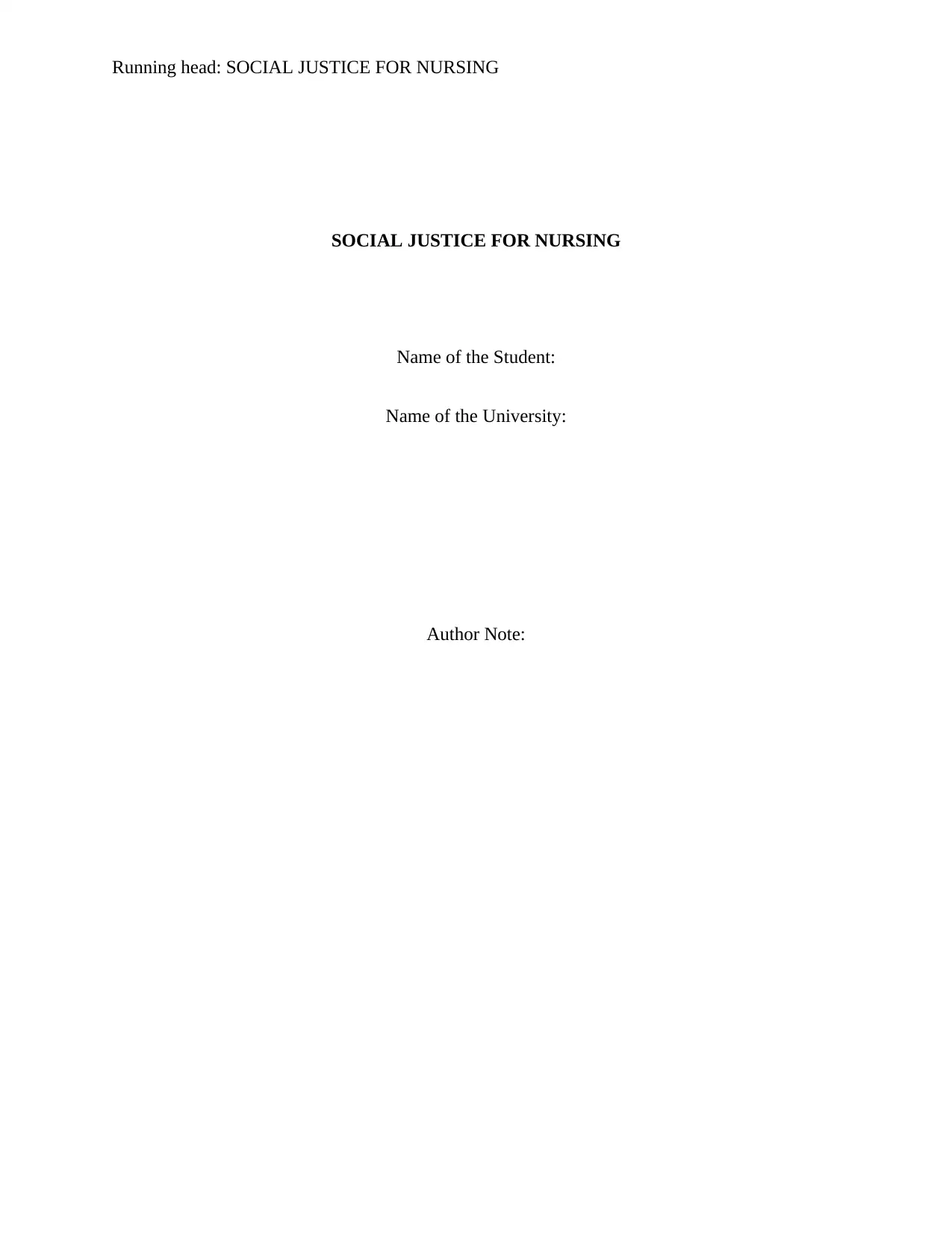
Running head: SOCIAL JUSTICE FOR NURSING
SOCIAL JUSTICE FOR NURSING
Name of the Student:
Name of the University:
Author Note:
SOCIAL JUSTICE FOR NURSING
Name of the Student:
Name of the University:
Author Note:
Paraphrase This Document
Need a fresh take? Get an instant paraphrase of this document with our AI Paraphraser
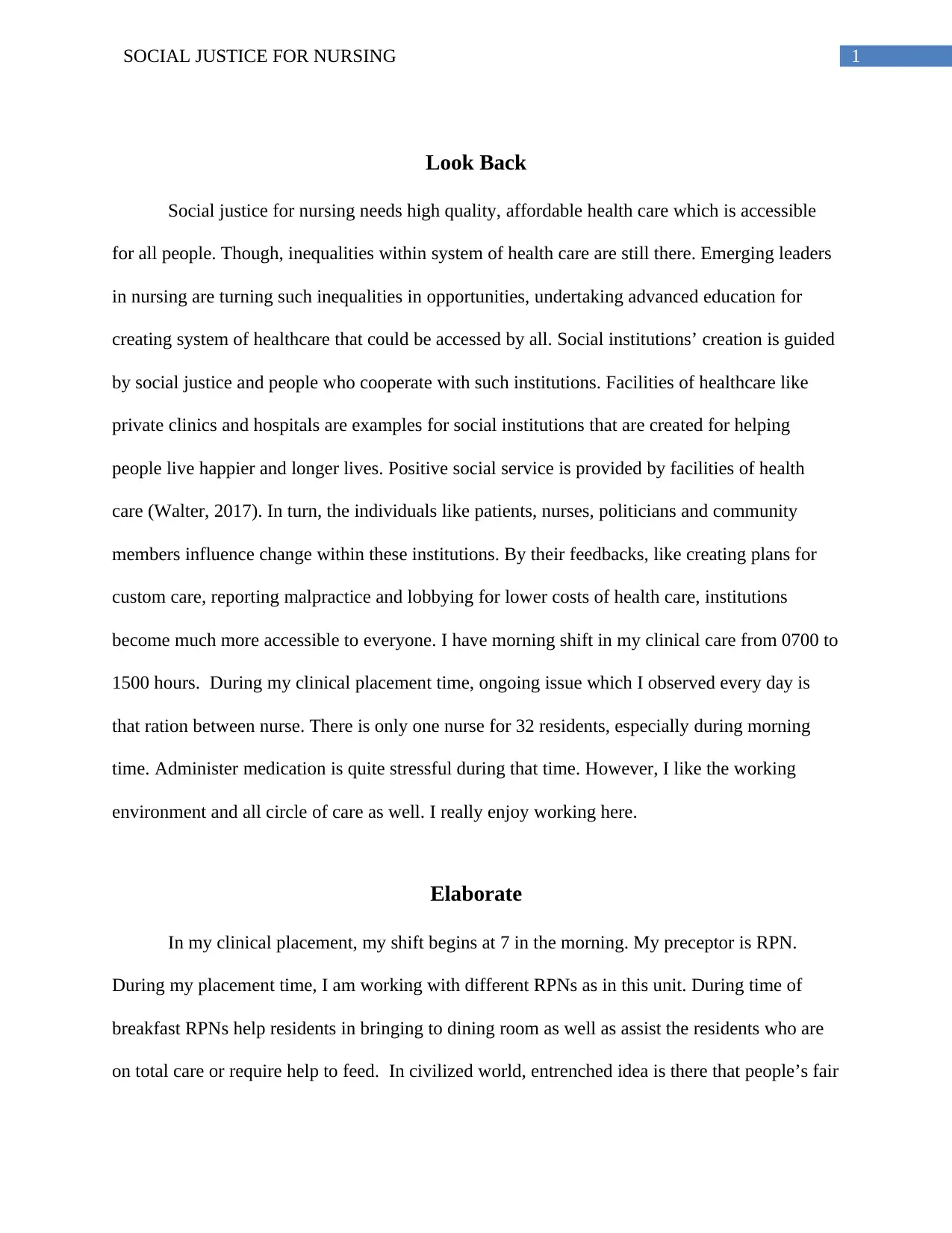
1SOCIAL JUSTICE FOR NURSING
Look Back
Social justice for nursing needs high quality, affordable health care which is accessible
for all people. Though, inequalities within system of health care are still there. Emerging leaders
in nursing are turning such inequalities in opportunities, undertaking advanced education for
creating system of healthcare that could be accessed by all. Social institutions’ creation is guided
by social justice and people who cooperate with such institutions. Facilities of healthcare like
private clinics and hospitals are examples for social institutions that are created for helping
people live happier and longer lives. Positive social service is provided by facilities of health
care (Walter, 2017). In turn, the individuals like patients, nurses, politicians and community
members influence change within these institutions. By their feedbacks, like creating plans for
custom care, reporting malpractice and lobbying for lower costs of health care, institutions
become much more accessible to everyone. I have morning shift in my clinical care from 0700 to
1500 hours. During my clinical placement time, ongoing issue which I observed every day is
that ration between nurse. There is only one nurse for 32 residents, especially during morning
time. Administer medication is quite stressful during that time. However, I like the working
environment and all circle of care as well. I really enjoy working here.
Elaborate
In my clinical placement, my shift begins at 7 in the morning. My preceptor is RPN.
During my placement time, I am working with different RPNs as in this unit. During time of
breakfast RPNs help residents in bringing to dining room as well as assist the residents who are
on total care or require help to feed. In civilized world, entrenched idea is there that people’s fair
Look Back
Social justice for nursing needs high quality, affordable health care which is accessible
for all people. Though, inequalities within system of health care are still there. Emerging leaders
in nursing are turning such inequalities in opportunities, undertaking advanced education for
creating system of healthcare that could be accessed by all. Social institutions’ creation is guided
by social justice and people who cooperate with such institutions. Facilities of healthcare like
private clinics and hospitals are examples for social institutions that are created for helping
people live happier and longer lives. Positive social service is provided by facilities of health
care (Walter, 2017). In turn, the individuals like patients, nurses, politicians and community
members influence change within these institutions. By their feedbacks, like creating plans for
custom care, reporting malpractice and lobbying for lower costs of health care, institutions
become much more accessible to everyone. I have morning shift in my clinical care from 0700 to
1500 hours. During my clinical placement time, ongoing issue which I observed every day is
that ration between nurse. There is only one nurse for 32 residents, especially during morning
time. Administer medication is quite stressful during that time. However, I like the working
environment and all circle of care as well. I really enjoy working here.
Elaborate
In my clinical placement, my shift begins at 7 in the morning. My preceptor is RPN.
During my placement time, I am working with different RPNs as in this unit. During time of
breakfast RPNs help residents in bringing to dining room as well as assist the residents who are
on total care or require help to feed. In civilized world, entrenched idea is there that people’s fair
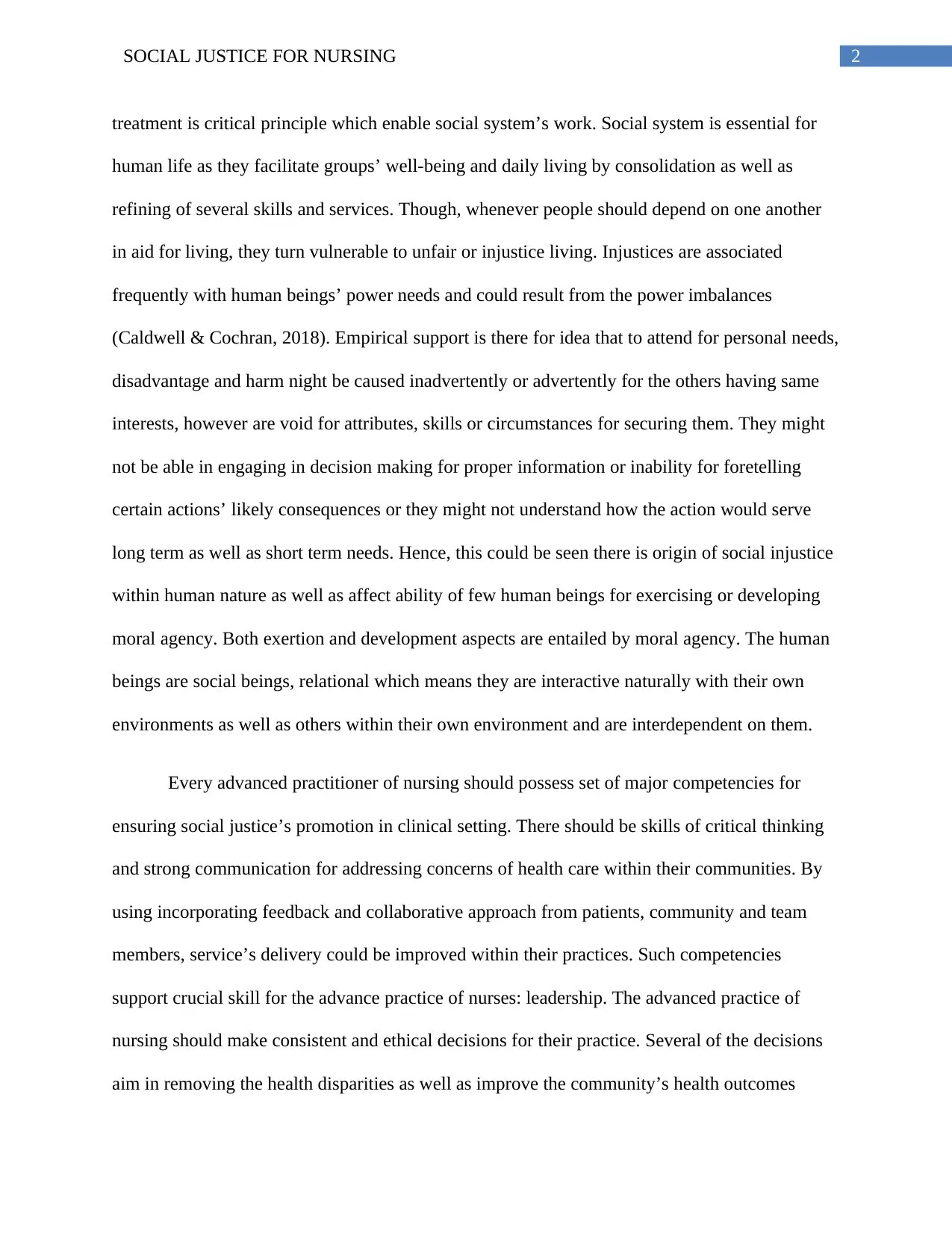
2SOCIAL JUSTICE FOR NURSING
treatment is critical principle which enable social system’s work. Social system is essential for
human life as they facilitate groups’ well-being and daily living by consolidation as well as
refining of several skills and services. Though, whenever people should depend on one another
in aid for living, they turn vulnerable to unfair or injustice living. Injustices are associated
frequently with human beings’ power needs and could result from the power imbalances
(Caldwell & Cochran, 2018). Empirical support is there for idea that to attend for personal needs,
disadvantage and harm night be caused inadvertently or advertently for the others having same
interests, however are void for attributes, skills or circumstances for securing them. They might
not be able in engaging in decision making for proper information or inability for foretelling
certain actions’ likely consequences or they might not understand how the action would serve
long term as well as short term needs. Hence, this could be seen there is origin of social injustice
within human nature as well as affect ability of few human beings for exercising or developing
moral agency. Both exertion and development aspects are entailed by moral agency. The human
beings are social beings, relational which means they are interactive naturally with their own
environments as well as others within their own environment and are interdependent on them.
Every advanced practitioner of nursing should possess set of major competencies for
ensuring social justice’s promotion in clinical setting. There should be skills of critical thinking
and strong communication for addressing concerns of health care within their communities. By
using incorporating feedback and collaborative approach from patients, community and team
members, service’s delivery could be improved within their practices. Such competencies
support crucial skill for the advance practice of nurses: leadership. The advanced practice of
nursing should make consistent and ethical decisions for their practice. Several of the decisions
aim in removing the health disparities as well as improve the community’s health outcomes
treatment is critical principle which enable social system’s work. Social system is essential for
human life as they facilitate groups’ well-being and daily living by consolidation as well as
refining of several skills and services. Though, whenever people should depend on one another
in aid for living, they turn vulnerable to unfair or injustice living. Injustices are associated
frequently with human beings’ power needs and could result from the power imbalances
(Caldwell & Cochran, 2018). Empirical support is there for idea that to attend for personal needs,
disadvantage and harm night be caused inadvertently or advertently for the others having same
interests, however are void for attributes, skills or circumstances for securing them. They might
not be able in engaging in decision making for proper information or inability for foretelling
certain actions’ likely consequences or they might not understand how the action would serve
long term as well as short term needs. Hence, this could be seen there is origin of social injustice
within human nature as well as affect ability of few human beings for exercising or developing
moral agency. Both exertion and development aspects are entailed by moral agency. The human
beings are social beings, relational which means they are interactive naturally with their own
environments as well as others within their own environment and are interdependent on them.
Every advanced practitioner of nursing should possess set of major competencies for
ensuring social justice’s promotion in clinical setting. There should be skills of critical thinking
and strong communication for addressing concerns of health care within their communities. By
using incorporating feedback and collaborative approach from patients, community and team
members, service’s delivery could be improved within their practices. Such competencies
support crucial skill for the advance practice of nurses: leadership. The advanced practice of
nursing should make consistent and ethical decisions for their practice. Several of the decisions
aim in removing the health disparities as well as improve the community’s health outcomes
⊘ This is a preview!⊘
Do you want full access?
Subscribe today to unlock all pages.

Trusted by 1+ million students worldwide
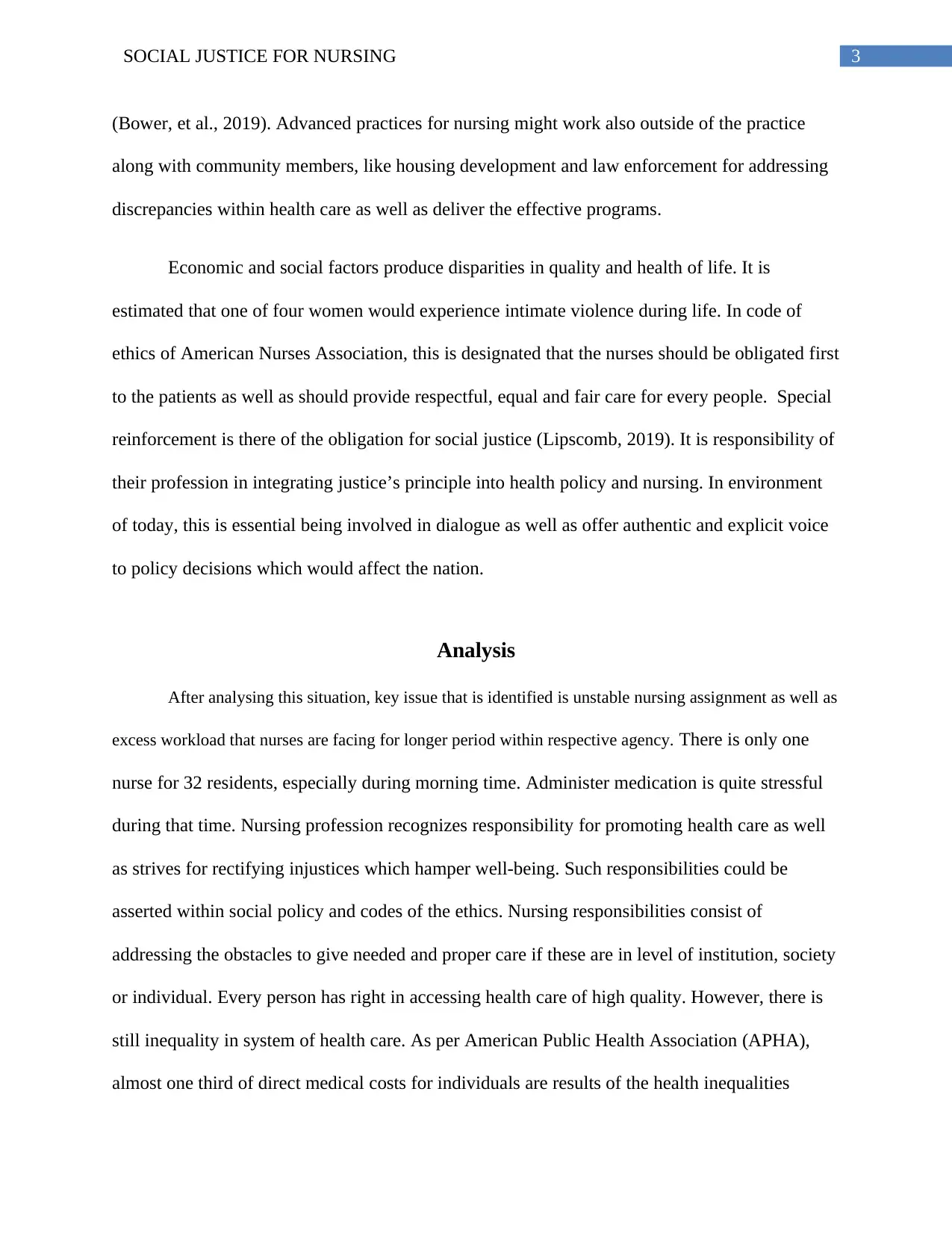
3SOCIAL JUSTICE FOR NURSING
(Bower, et al., 2019). Advanced practices for nursing might work also outside of the practice
along with community members, like housing development and law enforcement for addressing
discrepancies within health care as well as deliver the effective programs.
Economic and social factors produce disparities in quality and health of life. It is
estimated that one of four women would experience intimate violence during life. In code of
ethics of American Nurses Association, this is designated that the nurses should be obligated first
to the patients as well as should provide respectful, equal and fair care for every people. Special
reinforcement is there of the obligation for social justice (Lipscomb, 2019). It is responsibility of
their profession in integrating justice’s principle into health policy and nursing. In environment
of today, this is essential being involved in dialogue as well as offer authentic and explicit voice
to policy decisions which would affect the nation.
Analysis
After analysing this situation, key issue that is identified is unstable nursing assignment as well as
excess workload that nurses are facing for longer period within respective agency. There is only one
nurse for 32 residents, especially during morning time. Administer medication is quite stressful
during that time. Nursing profession recognizes responsibility for promoting health care as well
as strives for rectifying injustices which hamper well-being. Such responsibilities could be
asserted within social policy and codes of the ethics. Nursing responsibilities consist of
addressing the obstacles to give needed and proper care if these are in level of institution, society
or individual. Every person has right in accessing health care of high quality. However, there is
still inequality in system of health care. As per American Public Health Association (APHA),
almost one third of direct medical costs for individuals are results of the health inequalities
(Bower, et al., 2019). Advanced practices for nursing might work also outside of the practice
along with community members, like housing development and law enforcement for addressing
discrepancies within health care as well as deliver the effective programs.
Economic and social factors produce disparities in quality and health of life. It is
estimated that one of four women would experience intimate violence during life. In code of
ethics of American Nurses Association, this is designated that the nurses should be obligated first
to the patients as well as should provide respectful, equal and fair care for every people. Special
reinforcement is there of the obligation for social justice (Lipscomb, 2019). It is responsibility of
their profession in integrating justice’s principle into health policy and nursing. In environment
of today, this is essential being involved in dialogue as well as offer authentic and explicit voice
to policy decisions which would affect the nation.
Analysis
After analysing this situation, key issue that is identified is unstable nursing assignment as well as
excess workload that nurses are facing for longer period within respective agency. There is only one
nurse for 32 residents, especially during morning time. Administer medication is quite stressful
during that time. Nursing profession recognizes responsibility for promoting health care as well
as strives for rectifying injustices which hamper well-being. Such responsibilities could be
asserted within social policy and codes of the ethics. Nursing responsibilities consist of
addressing the obstacles to give needed and proper care if these are in level of institution, society
or individual. Every person has right in accessing health care of high quality. However, there is
still inequality in system of health care. As per American Public Health Association (APHA),
almost one third of direct medical costs for individuals are results of the health inequalities
Paraphrase This Document
Need a fresh take? Get an instant paraphrase of this document with our AI Paraphraser
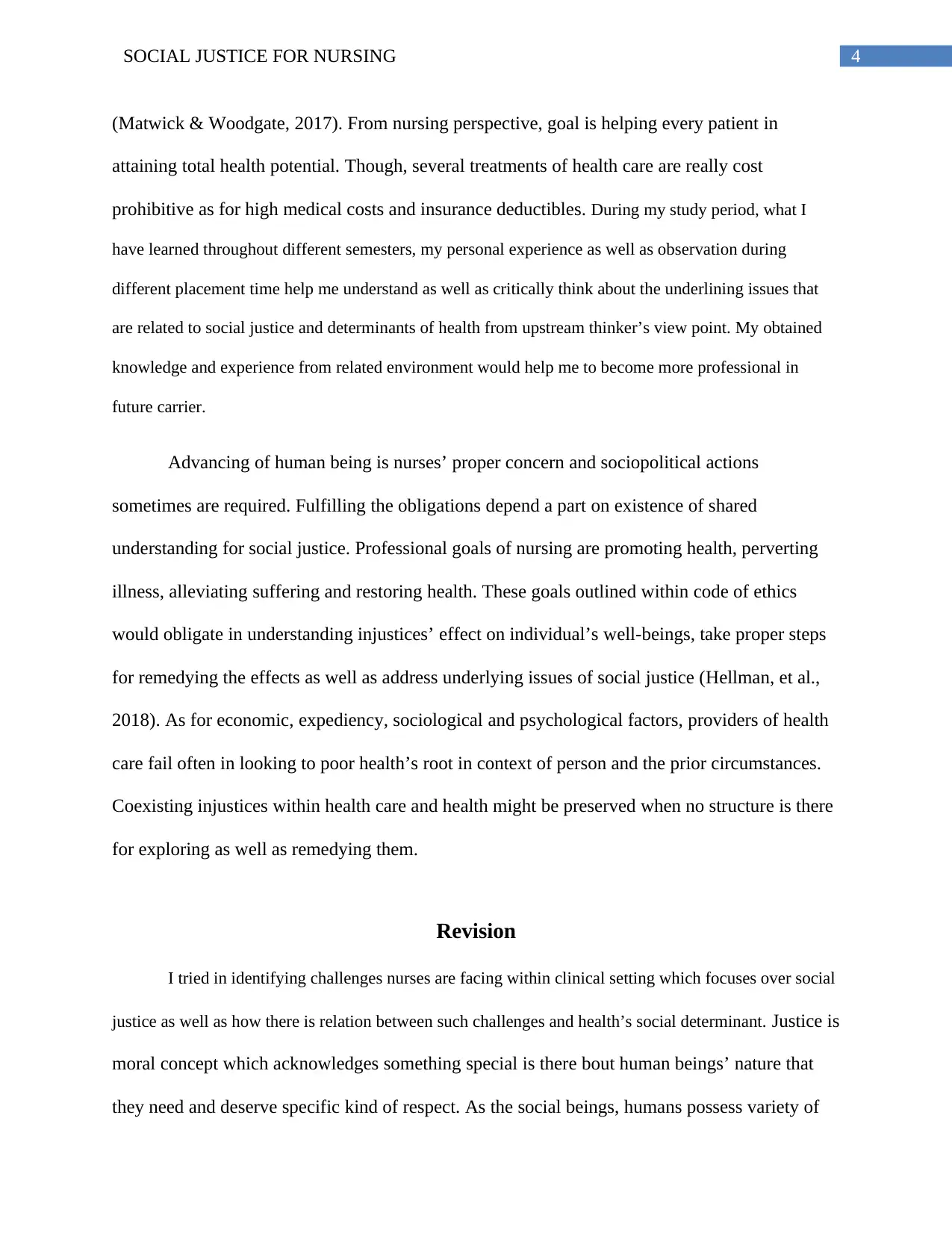
4SOCIAL JUSTICE FOR NURSING
(Matwick & Woodgate, 2017). From nursing perspective, goal is helping every patient in
attaining total health potential. Though, several treatments of health care are really cost
prohibitive as for high medical costs and insurance deductibles. During my study period, what I
have learned throughout different semesters, my personal experience as well as observation during
different placement time help me understand as well as critically think about the underlining issues that
are related to social justice and determinants of health from upstream thinker’s view point. My obtained
knowledge and experience from related environment would help me to become more professional in
future carrier.
Advancing of human being is nurses’ proper concern and sociopolitical actions
sometimes are required. Fulfilling the obligations depend a part on existence of shared
understanding for social justice. Professional goals of nursing are promoting health, perverting
illness, alleviating suffering and restoring health. These goals outlined within code of ethics
would obligate in understanding injustices’ effect on individual’s well-beings, take proper steps
for remedying the effects as well as address underlying issues of social justice (Hellman, et al.,
2018). As for economic, expediency, sociological and psychological factors, providers of health
care fail often in looking to poor health’s root in context of person and the prior circumstances.
Coexisting injustices within health care and health might be preserved when no structure is there
for exploring as well as remedying them.
Revision
I tried in identifying challenges nurses are facing within clinical setting which focuses over social
justice as well as how there is relation between such challenges and health’s social determinant. Justice is
moral concept which acknowledges something special is there bout human beings’ nature that
they need and deserve specific kind of respect. As the social beings, humans possess variety of
(Matwick & Woodgate, 2017). From nursing perspective, goal is helping every patient in
attaining total health potential. Though, several treatments of health care are really cost
prohibitive as for high medical costs and insurance deductibles. During my study period, what I
have learned throughout different semesters, my personal experience as well as observation during
different placement time help me understand as well as critically think about the underlining issues that
are related to social justice and determinants of health from upstream thinker’s view point. My obtained
knowledge and experience from related environment would help me to become more professional in
future carrier.
Advancing of human being is nurses’ proper concern and sociopolitical actions
sometimes are required. Fulfilling the obligations depend a part on existence of shared
understanding for social justice. Professional goals of nursing are promoting health, perverting
illness, alleviating suffering and restoring health. These goals outlined within code of ethics
would obligate in understanding injustices’ effect on individual’s well-beings, take proper steps
for remedying the effects as well as address underlying issues of social justice (Hellman, et al.,
2018). As for economic, expediency, sociological and psychological factors, providers of health
care fail often in looking to poor health’s root in context of person and the prior circumstances.
Coexisting injustices within health care and health might be preserved when no structure is there
for exploring as well as remedying them.
Revision
I tried in identifying challenges nurses are facing within clinical setting which focuses over social
justice as well as how there is relation between such challenges and health’s social determinant. Justice is
moral concept which acknowledges something special is there bout human beings’ nature that
they need and deserve specific kind of respect. As the social beings, humans possess variety of
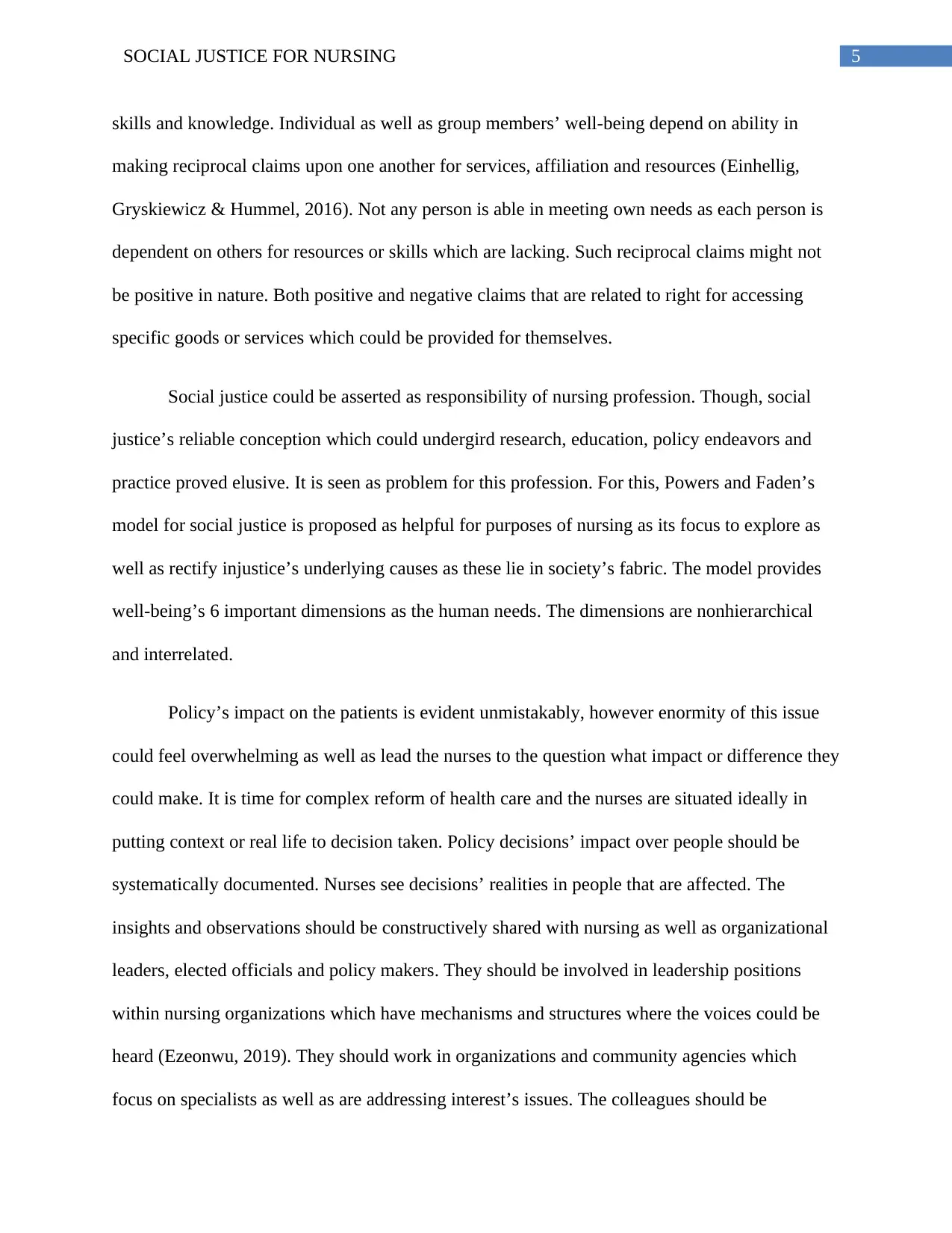
5SOCIAL JUSTICE FOR NURSING
skills and knowledge. Individual as well as group members’ well-being depend on ability in
making reciprocal claims upon one another for services, affiliation and resources (Einhellig,
Gryskiewicz & Hummel, 2016). Not any person is able in meeting own needs as each person is
dependent on others for resources or skills which are lacking. Such reciprocal claims might not
be positive in nature. Both positive and negative claims that are related to right for accessing
specific goods or services which could be provided for themselves.
Social justice could be asserted as responsibility of nursing profession. Though, social
justice’s reliable conception which could undergird research, education, policy endeavors and
practice proved elusive. It is seen as problem for this profession. For this, Powers and Faden’s
model for social justice is proposed as helpful for purposes of nursing as its focus to explore as
well as rectify injustice’s underlying causes as these lie in society’s fabric. The model provides
well-being’s 6 important dimensions as the human needs. The dimensions are nonhierarchical
and interrelated.
Policy’s impact on the patients is evident unmistakably, however enormity of this issue
could feel overwhelming as well as lead the nurses to the question what impact or difference they
could make. It is time for complex reform of health care and the nurses are situated ideally in
putting context or real life to decision taken. Policy decisions’ impact over people should be
systematically documented. Nurses see decisions’ realities in people that are affected. The
insights and observations should be constructively shared with nursing as well as organizational
leaders, elected officials and policy makers. They should be involved in leadership positions
within nursing organizations which have mechanisms and structures where the voices could be
heard (Ezeonwu, 2019). They should work in organizations and community agencies which
focus on specialists as well as are addressing interest’s issues. The colleagues should be
skills and knowledge. Individual as well as group members’ well-being depend on ability in
making reciprocal claims upon one another for services, affiliation and resources (Einhellig,
Gryskiewicz & Hummel, 2016). Not any person is able in meeting own needs as each person is
dependent on others for resources or skills which are lacking. Such reciprocal claims might not
be positive in nature. Both positive and negative claims that are related to right for accessing
specific goods or services which could be provided for themselves.
Social justice could be asserted as responsibility of nursing profession. Though, social
justice’s reliable conception which could undergird research, education, policy endeavors and
practice proved elusive. It is seen as problem for this profession. For this, Powers and Faden’s
model for social justice is proposed as helpful for purposes of nursing as its focus to explore as
well as rectify injustice’s underlying causes as these lie in society’s fabric. The model provides
well-being’s 6 important dimensions as the human needs. The dimensions are nonhierarchical
and interrelated.
Policy’s impact on the patients is evident unmistakably, however enormity of this issue
could feel overwhelming as well as lead the nurses to the question what impact or difference they
could make. It is time for complex reform of health care and the nurses are situated ideally in
putting context or real life to decision taken. Policy decisions’ impact over people should be
systematically documented. Nurses see decisions’ realities in people that are affected. The
insights and observations should be constructively shared with nursing as well as organizational
leaders, elected officials and policy makers. They should be involved in leadership positions
within nursing organizations which have mechanisms and structures where the voices could be
heard (Ezeonwu, 2019). They should work in organizations and community agencies which
focus on specialists as well as are addressing interest’s issues. The colleagues should be
⊘ This is a preview!⊘
Do you want full access?
Subscribe today to unlock all pages.

Trusted by 1+ million students worldwide
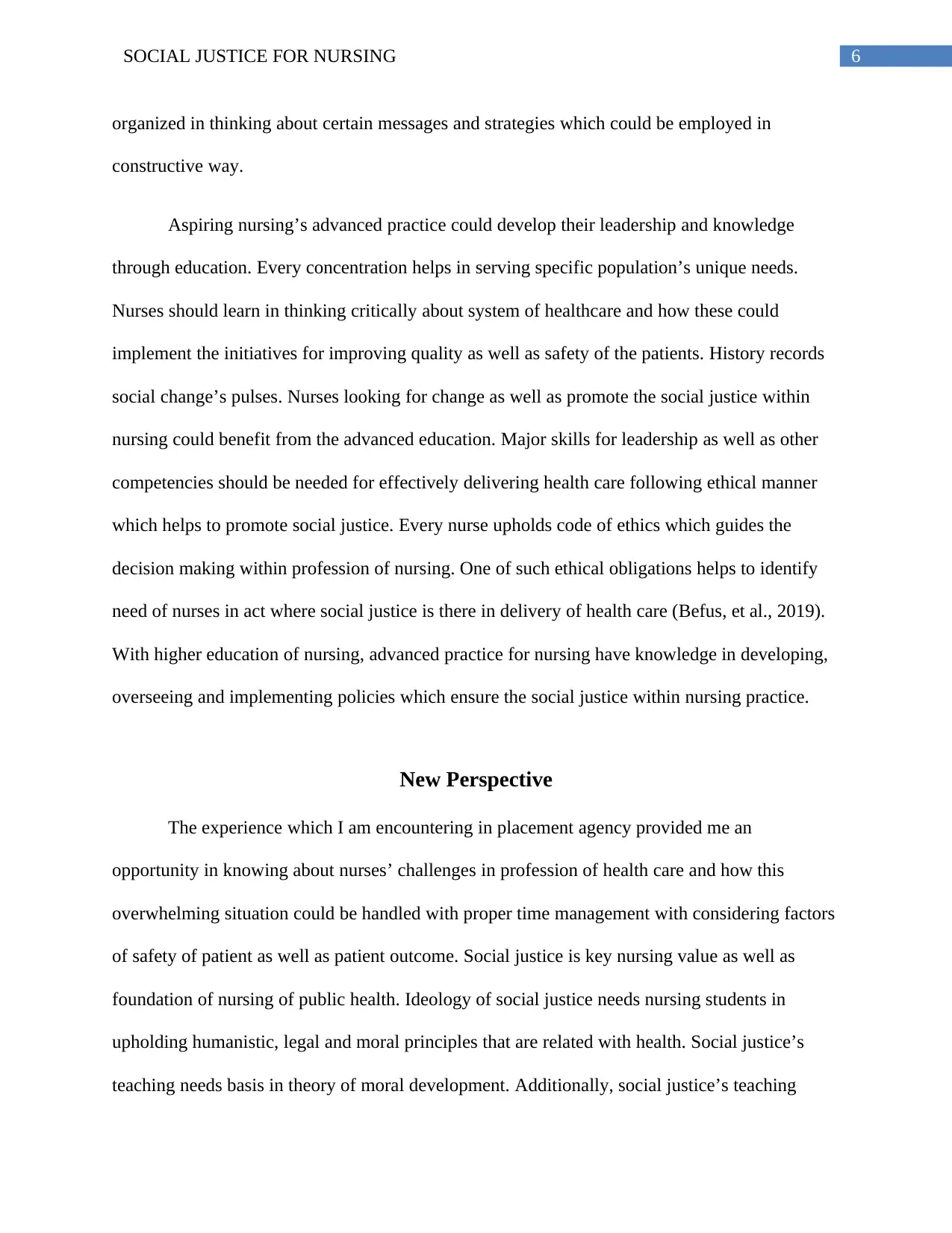
6SOCIAL JUSTICE FOR NURSING
organized in thinking about certain messages and strategies which could be employed in
constructive way.
Aspiring nursing’s advanced practice could develop their leadership and knowledge
through education. Every concentration helps in serving specific population’s unique needs.
Nurses should learn in thinking critically about system of healthcare and how these could
implement the initiatives for improving quality as well as safety of the patients. History records
social change’s pulses. Nurses looking for change as well as promote the social justice within
nursing could benefit from the advanced education. Major skills for leadership as well as other
competencies should be needed for effectively delivering health care following ethical manner
which helps to promote social justice. Every nurse upholds code of ethics which guides the
decision making within profession of nursing. One of such ethical obligations helps to identify
need of nurses in act where social justice is there in delivery of health care (Befus, et al., 2019).
With higher education of nursing, advanced practice for nursing have knowledge in developing,
overseeing and implementing policies which ensure the social justice within nursing practice.
New Perspective
The experience which I am encountering in placement agency provided me an
opportunity in knowing about nurses’ challenges in profession of health care and how this
overwhelming situation could be handled with proper time management with considering factors
of safety of patient as well as patient outcome. Social justice is key nursing value as well as
foundation of nursing of public health. Ideology of social justice needs nursing students in
upholding humanistic, legal and moral principles that are related with health. Social justice’s
teaching needs basis in theory of moral development. Additionally, social justice’s teaching
organized in thinking about certain messages and strategies which could be employed in
constructive way.
Aspiring nursing’s advanced practice could develop their leadership and knowledge
through education. Every concentration helps in serving specific population’s unique needs.
Nurses should learn in thinking critically about system of healthcare and how these could
implement the initiatives for improving quality as well as safety of the patients. History records
social change’s pulses. Nurses looking for change as well as promote the social justice within
nursing could benefit from the advanced education. Major skills for leadership as well as other
competencies should be needed for effectively delivering health care following ethical manner
which helps to promote social justice. Every nurse upholds code of ethics which guides the
decision making within profession of nursing. One of such ethical obligations helps to identify
need of nurses in act where social justice is there in delivery of health care (Befus, et al., 2019).
With higher education of nursing, advanced practice for nursing have knowledge in developing,
overseeing and implementing policies which ensure the social justice within nursing practice.
New Perspective
The experience which I am encountering in placement agency provided me an
opportunity in knowing about nurses’ challenges in profession of health care and how this
overwhelming situation could be handled with proper time management with considering factors
of safety of patient as well as patient outcome. Social justice is key nursing value as well as
foundation of nursing of public health. Ideology of social justice needs nursing students in
upholding humanistic, legal and moral principles that are related with health. Social justice’s
teaching needs basis in theory of moral development. Additionally, social justice’s teaching
Paraphrase This Document
Need a fresh take? Get an instant paraphrase of this document with our AI Paraphraser
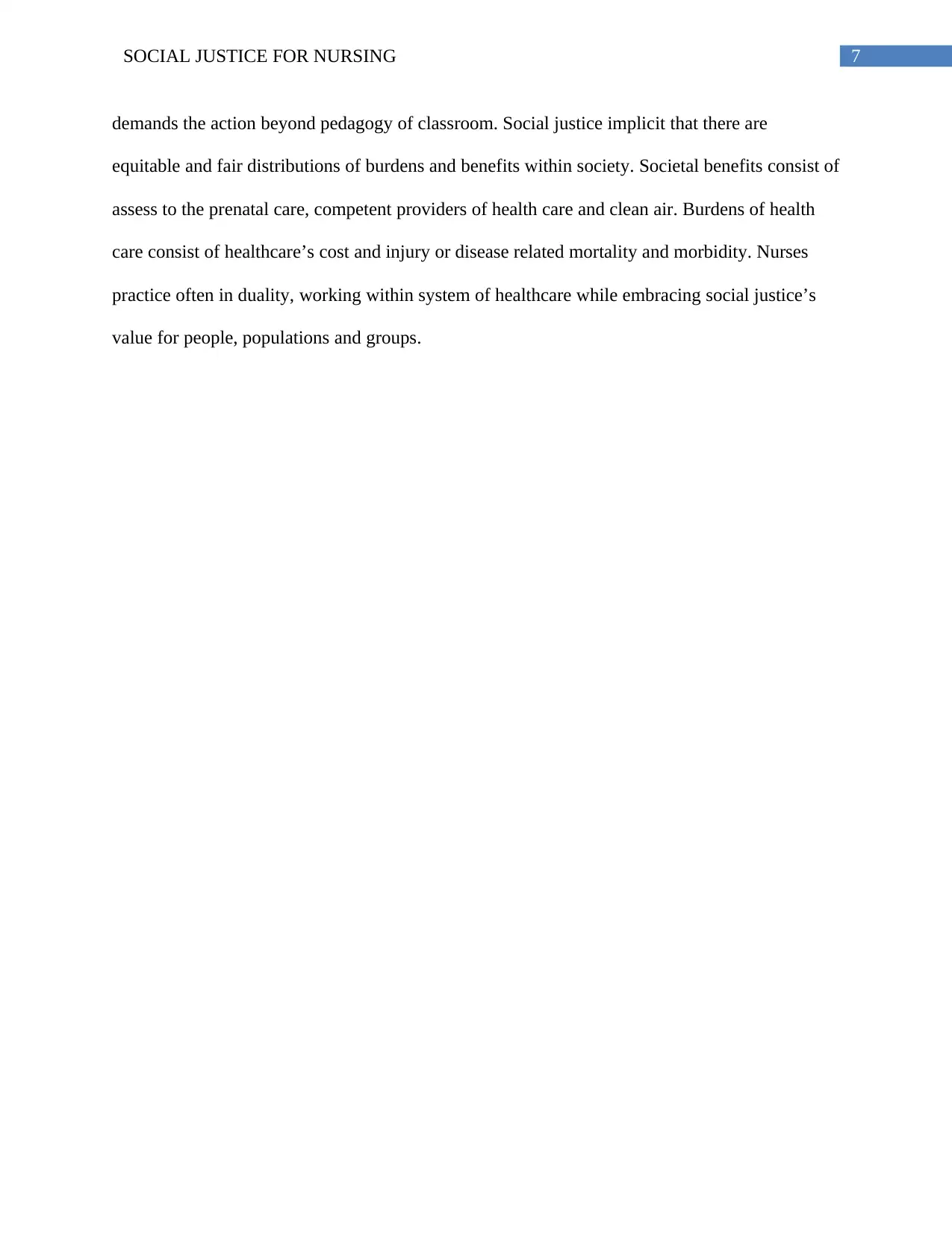
7SOCIAL JUSTICE FOR NURSING
demands the action beyond pedagogy of classroom. Social justice implicit that there are
equitable and fair distributions of burdens and benefits within society. Societal benefits consist of
assess to the prenatal care, competent providers of health care and clean air. Burdens of health
care consist of healthcare’s cost and injury or disease related mortality and morbidity. Nurses
practice often in duality, working within system of healthcare while embracing social justice’s
value for people, populations and groups.
demands the action beyond pedagogy of classroom. Social justice implicit that there are
equitable and fair distributions of burdens and benefits within society. Societal benefits consist of
assess to the prenatal care, competent providers of health care and clean air. Burdens of health
care consist of healthcare’s cost and injury or disease related mortality and morbidity. Nurses
practice often in duality, working within system of healthcare while embracing social justice’s
value for people, populations and groups.
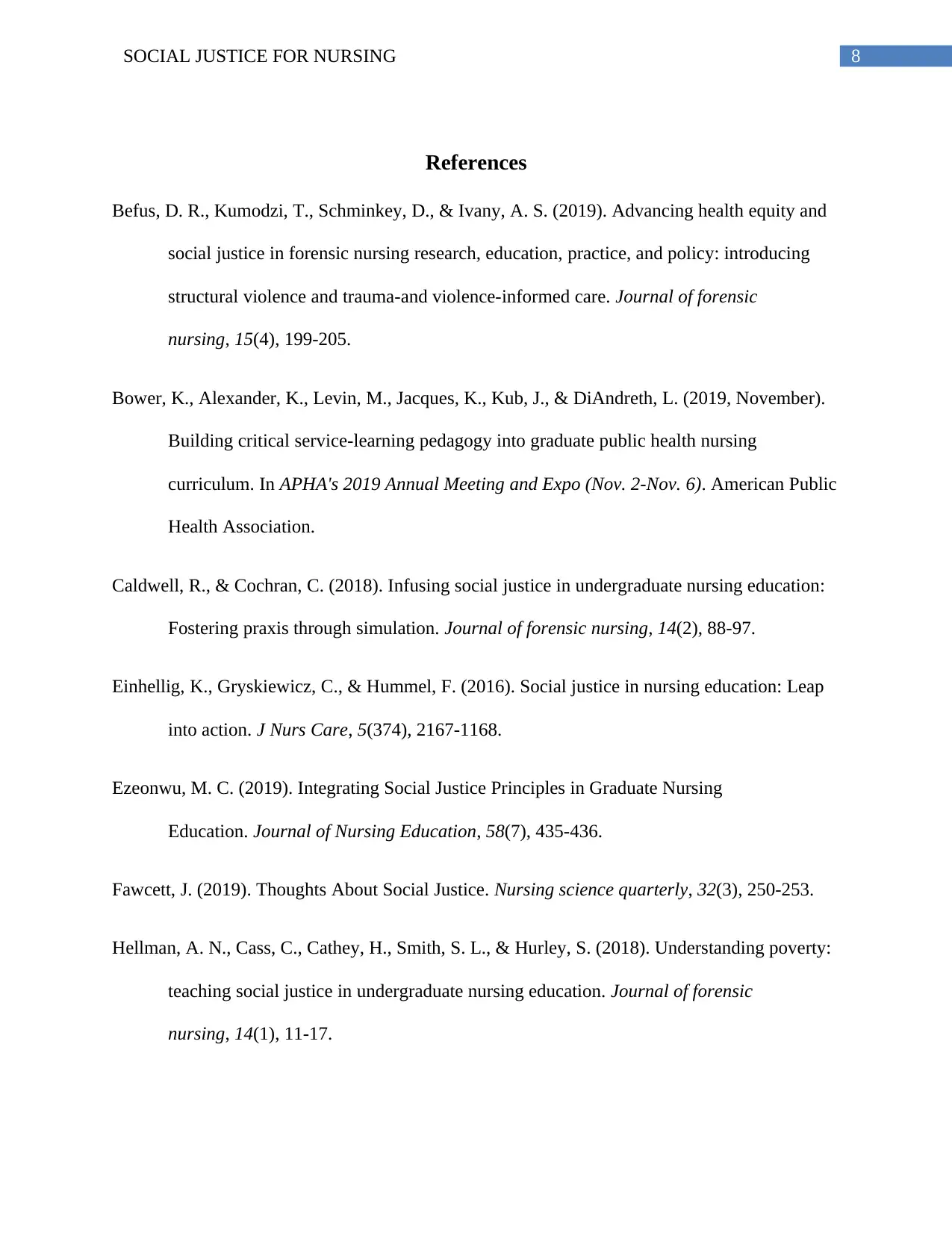
8SOCIAL JUSTICE FOR NURSING
References
Befus, D. R., Kumodzi, T., Schminkey, D., & Ivany, A. S. (2019). Advancing health equity and
social justice in forensic nursing research, education, practice, and policy: introducing
structural violence and trauma-and violence-informed care. Journal of forensic
nursing, 15(4), 199-205.
Bower, K., Alexander, K., Levin, M., Jacques, K., Kub, J., & DiAndreth, L. (2019, November).
Building critical service-learning pedagogy into graduate public health nursing
curriculum. In APHA's 2019 Annual Meeting and Expo (Nov. 2-Nov. 6). American Public
Health Association.
Caldwell, R., & Cochran, C. (2018). Infusing social justice in undergraduate nursing education:
Fostering praxis through simulation. Journal of forensic nursing, 14(2), 88-97.
Einhellig, K., Gryskiewicz, C., & Hummel, F. (2016). Social justice in nursing education: Leap
into action. J Nurs Care, 5(374), 2167-1168.
Ezeonwu, M. C. (2019). Integrating Social Justice Principles in Graduate Nursing
Education. Journal of Nursing Education, 58(7), 435-436.
Fawcett, J. (2019). Thoughts About Social Justice. Nursing science quarterly, 32(3), 250-253.
Hellman, A. N., Cass, C., Cathey, H., Smith, S. L., & Hurley, S. (2018). Understanding poverty:
teaching social justice in undergraduate nursing education. Journal of forensic
nursing, 14(1), 11-17.
References
Befus, D. R., Kumodzi, T., Schminkey, D., & Ivany, A. S. (2019). Advancing health equity and
social justice in forensic nursing research, education, practice, and policy: introducing
structural violence and trauma-and violence-informed care. Journal of forensic
nursing, 15(4), 199-205.
Bower, K., Alexander, K., Levin, M., Jacques, K., Kub, J., & DiAndreth, L. (2019, November).
Building critical service-learning pedagogy into graduate public health nursing
curriculum. In APHA's 2019 Annual Meeting and Expo (Nov. 2-Nov. 6). American Public
Health Association.
Caldwell, R., & Cochran, C. (2018). Infusing social justice in undergraduate nursing education:
Fostering praxis through simulation. Journal of forensic nursing, 14(2), 88-97.
Einhellig, K., Gryskiewicz, C., & Hummel, F. (2016). Social justice in nursing education: Leap
into action. J Nurs Care, 5(374), 2167-1168.
Ezeonwu, M. C. (2019). Integrating Social Justice Principles in Graduate Nursing
Education. Journal of Nursing Education, 58(7), 435-436.
Fawcett, J. (2019). Thoughts About Social Justice. Nursing science quarterly, 32(3), 250-253.
Hellman, A. N., Cass, C., Cathey, H., Smith, S. L., & Hurley, S. (2018). Understanding poverty:
teaching social justice in undergraduate nursing education. Journal of forensic
nursing, 14(1), 11-17.
⊘ This is a preview!⊘
Do you want full access?
Subscribe today to unlock all pages.

Trusted by 1+ million students worldwide
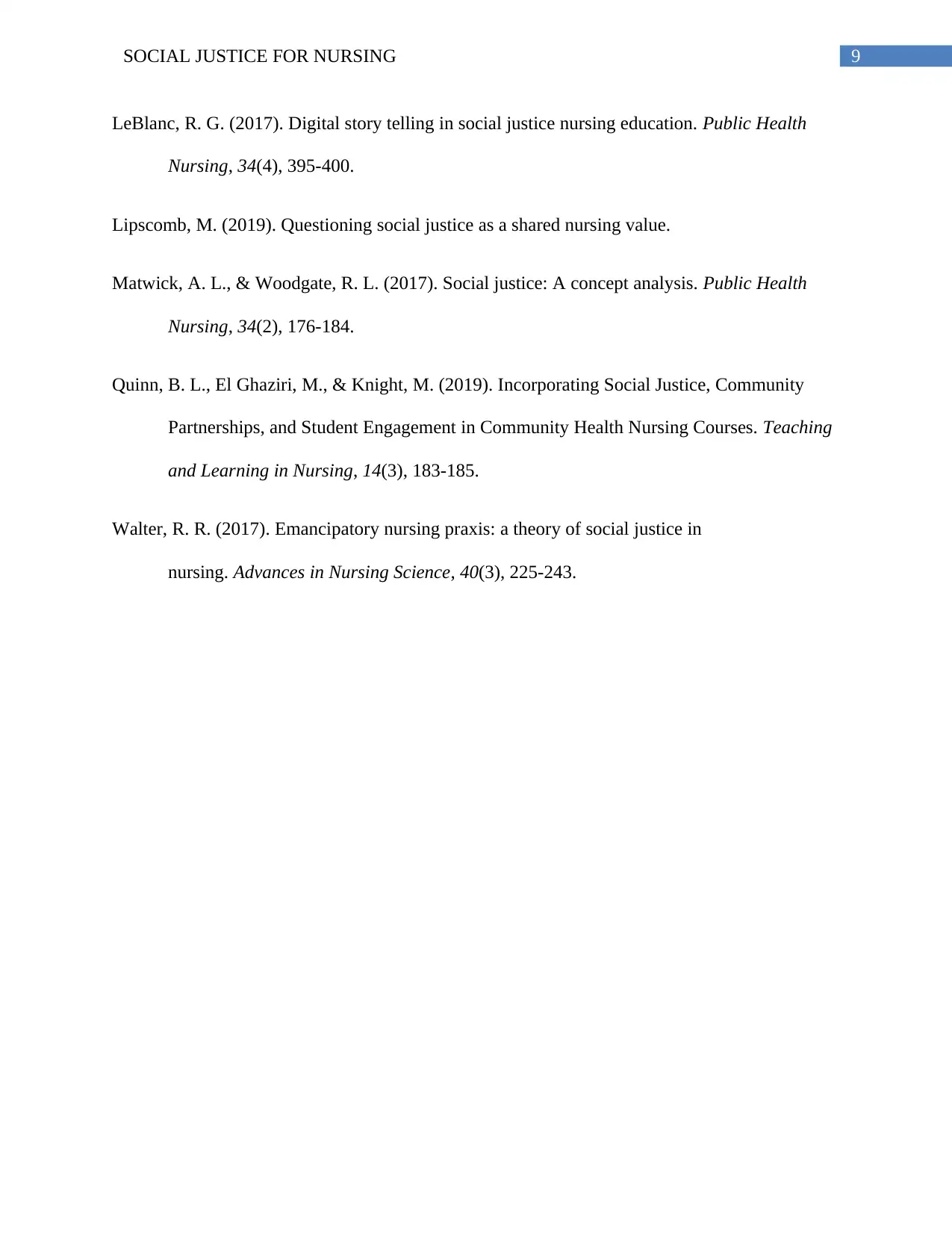
9SOCIAL JUSTICE FOR NURSING
LeBlanc, R. G. (2017). Digital story telling in social justice nursing education. Public Health
Nursing, 34(4), 395-400.
Lipscomb, M. (2019). Questioning social justice as a shared nursing value.
Matwick, A. L., & Woodgate, R. L. (2017). Social justice: A concept analysis. Public Health
Nursing, 34(2), 176-184.
Quinn, B. L., El Ghaziri, M., & Knight, M. (2019). Incorporating Social Justice, Community
Partnerships, and Student Engagement in Community Health Nursing Courses. Teaching
and Learning in Nursing, 14(3), 183-185.
Walter, R. R. (2017). Emancipatory nursing praxis: a theory of social justice in
nursing. Advances in Nursing Science, 40(3), 225-243.
LeBlanc, R. G. (2017). Digital story telling in social justice nursing education. Public Health
Nursing, 34(4), 395-400.
Lipscomb, M. (2019). Questioning social justice as a shared nursing value.
Matwick, A. L., & Woodgate, R. L. (2017). Social justice: A concept analysis. Public Health
Nursing, 34(2), 176-184.
Quinn, B. L., El Ghaziri, M., & Knight, M. (2019). Incorporating Social Justice, Community
Partnerships, and Student Engagement in Community Health Nursing Courses. Teaching
and Learning in Nursing, 14(3), 183-185.
Walter, R. R. (2017). Emancipatory nursing praxis: a theory of social justice in
nursing. Advances in Nursing Science, 40(3), 225-243.
1 out of 10
Related Documents
Your All-in-One AI-Powered Toolkit for Academic Success.
+13062052269
info@desklib.com
Available 24*7 on WhatsApp / Email
![[object Object]](/_next/static/media/star-bottom.7253800d.svg)
Unlock your academic potential
Copyright © 2020–2026 A2Z Services. All Rights Reserved. Developed and managed by ZUCOL.





